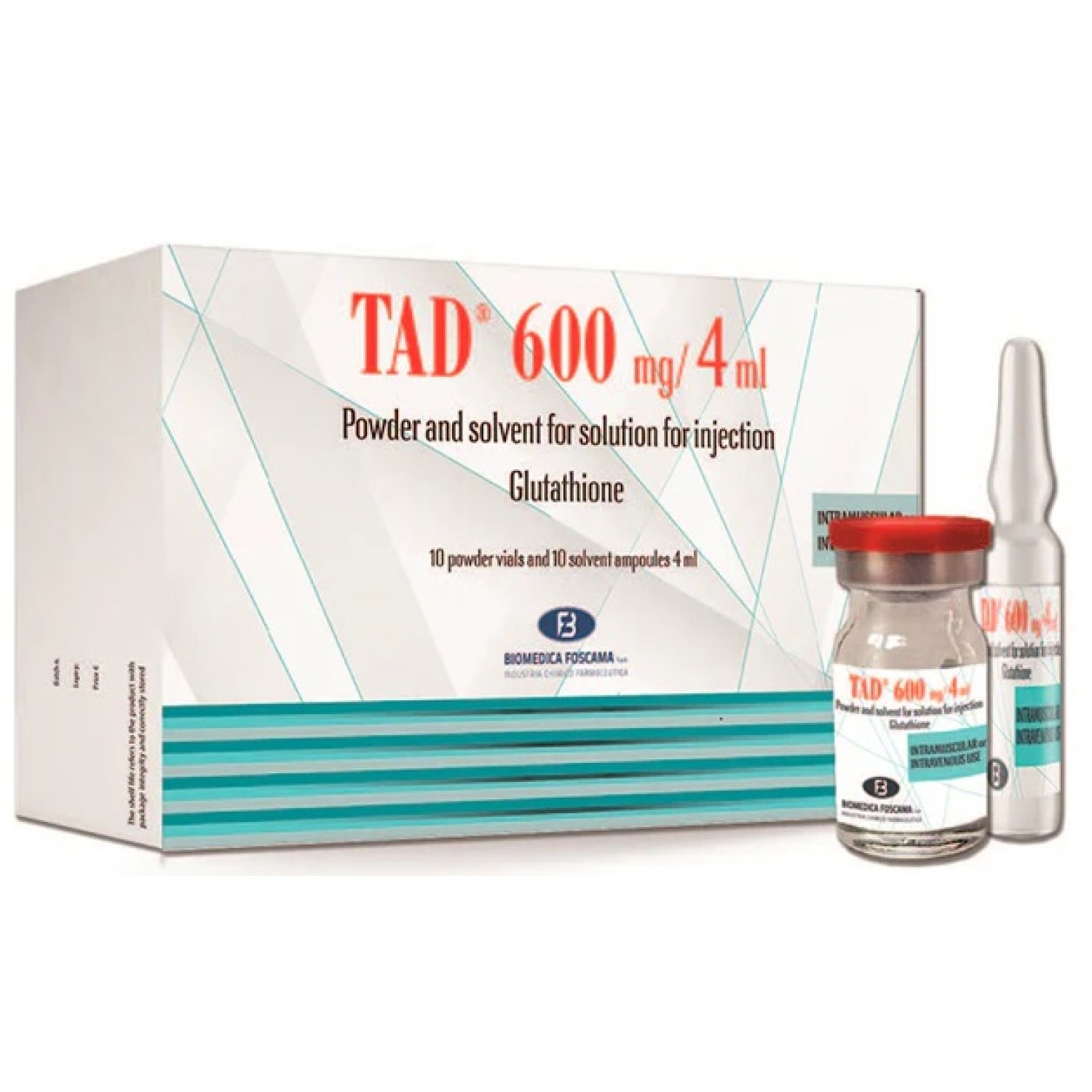
- Stock: In Stock
- Package: 600 mg/vial + water х 10 vials
Ask a Question About This Product
What is TAD-600 (Glutathione)
Mechanism of Action
- Relieve muscle and joint pain
- Repair the damage
- Regulate inflammation
- Stimulate the synthesis and growth of muscle protein
- Reduce the risk of diseases or infections
- Prevent muscle fatigue
- Increase energy levels
- Improve the functioning of the cardiovascular system
- They increase physical activity and endurance
Oxidative stress Glutathione is best known for its ability to prevent oxidative stress. Oxidative stress occurs when antioxidants are insufficient to fight free radicals, which leads to damage to cells and tissues. Oxidative stress can manifest itself in many biological systems and cause many negative consequences. Glutathione is superior to other antioxidants in preventing oxidative stress because it can neutralize a wide range of free radicals, either by directly binding to them or by blocking their absorption. Glutathione deficiency Physically active people often have glutathione deficiency. During exercise, the level of glutathione decreases rapidly due to an increase in its absorption by tissues. The more a person trains, the more exhausted they become. This makes oxidative stress more severe and widespread. This can cause a variety of problems, such as muscle and joint pain, weakness, and vulnerability to infections and injuries. Improving muscle performance After a workout, oxidative stress primarily affects your muscles. It can cause muscle fatigue, which reduces the amount of effort your muscles can perform. Because of this, the ability to progress during training decreases, and it may have to be completely suspended. The time required for tissue repair is also affected by a decrease in glutathione levels, which leads to more intense and prolonged pain in muscles and joints, as well as injuries. Glutathione supplements combat oxidative stress by reducing muscle fatigue and promoting recovery after intense physical exertion. Enhance immunity Glutathione plays an important role in the immune system. It increases or reduces inflammation to a certain level by controlling white blood cells. It also limits the amount of negative cytokines, proteins that send signals that disrupt the proper inflammatory response. Glutathione also helps the immune system prevent and cure infections and diseases. Athletes are more susceptible to them because intense physical activity reduces immunity. Glutathione helps by commanding certain white blood cells, such as NK and T cells, to fight bacteria and viruses. Inflammation The inflammation process occurs not only in injuries such as sprains of muscles or ligaments; it is also activated to eliminate microscopic muscle tears that occur instantly during exercise. Because of this, glutathione is considered an incredibly effective regenerating nutrient, which is especially useful for those who exercise regularly. Glutathione and COVID-19
Benefits of Glutathione
- Liver diseases: Helps in the treatment of hepatitis and other liver disorders by detoxifying harmful substances.
- Cancer treatment: Used to mitigate the toxic side effects of chemotherapy and radiation therapy.
- Immune support: Enhances the immune system, especially in conditions like AIDS.
- Neurodegenerative diseases: Benefits patients with Parkinson's disease and Alzheimer's disease by reducing oxidative stress in the brain.
- Cardiovascular diseases: Helps in the treatment of atherosclerosis by improving blood flow and reducing blood clotting.
- Lung diseases: Effective in treating pulmonary diseases like idiopathic pulmonary fibrosis and cystic fibrosis.
- Metabolic disorders: Aids in managing diabetes and preventing complications associated with it.
- Male infertility: Used to improve sperm quality and treat infertility in men.
- General health: Supports overall health by preventing aging, enhancing memory, and maintaining cellular health.
Dosage and Administration
In medicine, for various liver lesions, such as alcoholic cirrhosis, glutathione is used in courses. Most often, these are droppers in a dosage of 1200-2400 mg per day for 30 days. The full cycle for healthy people who want to increase antioxidant protection includes about 10 procedures. The duration of one procedure is about 30 minutes, and the intervals between droppers are 1-7 days. The intervals between procedures, as well as the dosage and the number of necessary droppers are calculated individually for each client.
One cycle usually includes about 10 intravenous infusions, then maintenance administration of antioxidants can be carried out regularly. The duration of action is also individual and depends on many factors. The course can be repeated after a while. Similar cycles are carried out in medical clinics as wellness/antiage procedures. Most likely, this method will be the closest to our goals.
Glutathione can also be administered intramuscularly, which greatly facilitates administration.
Based on the information that can be found on the Internet about the use of glutathione in sports practice, some athletes give one injection every 3 days, someone once a week throughout the entire cycle.
Dave from the YouTube channel RxMuscle - The Truth in Bodybuilding says he uses 200 mg every day.
Unfortunately, there are no exact protocols and it is important to focus on your own feelings here.
Side Effects
- Allergic reactions: Rash, itching, or swelling.
- Injection site reactions: Pain, redness, or swelling.
- Gastrointestinal issues: Nausea or vomiting.
- Headache or dizziness.
Precautions
- Allergies: Inform your healthcare provider of any known allergies.
- Pregnancy and breastfeeding: Use under medical supervision.
- Chronic conditions: Patients with chronic diseases should consult their doctor before starting treatment.
- Avoid concomitant use with sodium menadione bisulfite, cyanocobalamin, calcium pantothenate, sulfonamide preparations and tetracyclines.


